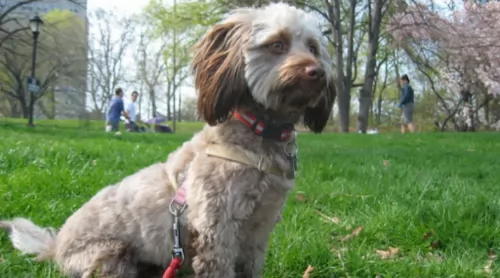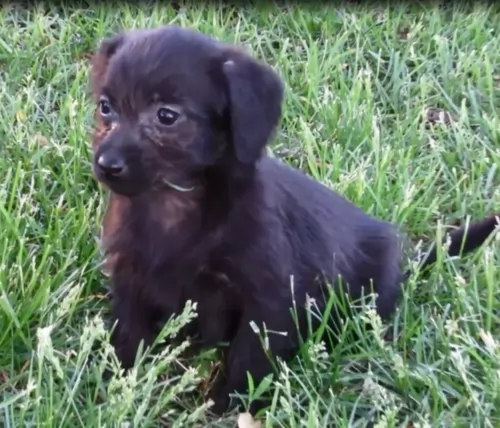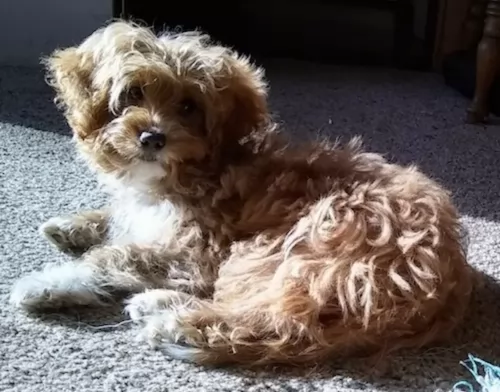 Petzlover
Petzlover Doxiepoo is originated from United States but Portuguese Podengo is originated from Portugal. Both Doxiepoo and Portuguese Podengo are having almost same height. Both Doxiepoo and Portuguese Podengo are having almost same weight. Both Doxiepoo and Portuguese Podengo has almost same life span. Both Doxiepoo and Portuguese Podengo has almost same litter size. Doxiepoo requires Moderate Maintenance. But Portuguese Podengo requires Low Maintenance
Doxiepoo is originated from United States but Portuguese Podengo is originated from Portugal. Both Doxiepoo and Portuguese Podengo are having almost same height. Both Doxiepoo and Portuguese Podengo are having almost same weight. Both Doxiepoo and Portuguese Podengo has almost same life span. Both Doxiepoo and Portuguese Podengo has almost same litter size. Doxiepoo requires Moderate Maintenance. But Portuguese Podengo requires Low Maintenance
 The Doxiepoo is a designer dog breed - a combination of the Dachshund who was used to hunt for Badgers and the Poodle, a dog bred in France to essentially be a lap dog. There is however some dispute as to whether the Poodle descends from Germany or from the French Barbet.
The Doxiepoo is a designer dog breed - a combination of the Dachshund who was used to hunt for Badgers and the Poodle, a dog bred in France to essentially be a lap dog. There is however some dispute as to whether the Poodle descends from Germany or from the French Barbet.
Wherever the parents hail from, the Doxiepoo hails from the United States of America.
With both the Poodle and the Dachshund being intelligent, fun and loving type of canines, the two of them together have brought out a wonderful hybrid pet in the Doxiepoo. Today, the Doxiepoo is bred with other Doxiepoos.
 The Portuguese Podengo is an ancient hound dog from Portugal. It is available as a small dog, medium and large dog.
The Portuguese Podengo is an ancient hound dog from Portugal. It is available as a small dog, medium and large dog.
The coats can be short and smooth or longer and wiry. They were imported into the United States in the 1990's and they are also recognized by the Federation Cynologique Internationale in Europe. They are also recognized by the United Kennel Club. In America they are part of the Rare Breed Association.
 The Doxiepoo can range from being a small to medium sized dog, standing at anything between 20cm to 25cm in size and weighing between 3kg and 7kg, depending much on whether a standard, miniature or toy sized poodle was used in the breeding.
The Doxiepoo can range from being a small to medium sized dog, standing at anything between 20cm to 25cm in size and weighing between 3kg and 7kg, depending much on whether a standard, miniature or toy sized poodle was used in the breeding.
The Doxiepoo could look like either one of the two breeds, but he will have a strong, sturdy body with a curly or wavy coat of varying lengths and various colors - cream, black, tan, apricot, grey or white. The poodle side of him ensures he is a hypoallergenic dog.
Between the Dachshund and the Poodle, you’re going to get a wonderful array of characteristics as they both come with their strong points. Certainly you will be well entertained and amused by your pet, while he can also be useful as a watchdog.
Being a small dog, he will fit well into life in the city or in the countryside. He is as bright as a button and learns tricks and new skills quickly. With training and socialization he becomes obedient and well behaved wherever he is, getting on well with other pets in the home as well as with all children and adults.
The Doxiepoo is a lively, alert, energetic dog and will require being exercised – lots of ball games and a walk will keep him lean, muscular and content.
 The Portuguese Podengo is available in three sizes. He stands roughly at between 20 to 30 cm and weighs between 4.1 to 5.9 kg. The dog is similar in looks to other hunting dogs native to the Mediterranean, such as the Pharoah Hound.
The Portuguese Podengo is available in three sizes. He stands roughly at between 20 to 30 cm and weighs between 4.1 to 5.9 kg. The dog is similar in looks to other hunting dogs native to the Mediterranean, such as the Pharoah Hound.
They are small to medium sized dogs. The eyes are brown, the ears are erect and the tail long and thick, held low and with a bit of a curve when at rest.
The body of the dog is lean and well muscled and the head wedge shaped. The coat is essentially short and smooth though you also get the longer, wiry coat. The coat is found in shades of fawn or yellow and with some white markings.
This Portuguese sighthound is energetic, comical sometimes, sweet and loving. Being alert, he also makes a good watchdog.
He is intelligent, he is easily trained and socialized and gets on well with children in the house if they have been disciplined to respect and be kind to animals.
He is somewhat aloof around strangers and this is actually what makes him a good watchdog.
It is said that the Portuguese Podengo isn't bred to be a companion dog, being bred exclusively as a working hunting dog. This explains why it doesn’t have such a ‘companionable’ temperament as some other dog breeds.
 Every dog, even the little ones like this, will require some kind of input from you if you want to get the best from him. Every puppy bought as a gift when they’re cute and cuddly turns into an adult, and often the very person who received him as a gift, loses interest and neglects him. Then they wonder why the dog becomes irritating and destructive.
Every dog, even the little ones like this, will require some kind of input from you if you want to get the best from him. Every puppy bought as a gift when they’re cute and cuddly turns into an adult, and often the very person who received him as a gift, loses interest and neglects him. Then they wonder why the dog becomes irritating and destructive.
A dog is a long term investment and if you commit to your sweet Doxiepoo, you’ll get years and years of devoted friendship.
 The Portuguese Podengo loves pleasing his human owners – loving to be in the company of his human family.
The Portuguese Podengo loves pleasing his human owners – loving to be in the company of his human family.
He is an independent dog who will benefit from training and socialization. He is wary around strangers, but this makes him a good watchdog.
He loves lots of exercise and will want mental and physical stimulation to be happy and content and as bright as he is.
Provide him with good care and he promises to make you a wonderful pet and companion.
 The life expectancy of the Doxiepoo is around 12-15 years of age if he is well looked after. He is a robust dog, but he can still face some health issues that both his parents contend with.
The life expectancy of the Doxiepoo is around 12-15 years of age if he is well looked after. He is a robust dog, but he can still face some health issues that both his parents contend with.
Just some of the diseases that the Doxiepoo might face while in your care are ear- and skin infections, dental disease, digestive tract problems, heart conditions and epilepsy. If you think your pet has any kind of illness, it is imperative to get him to the vet for a checkup.
Poodles, particularly are prone to skin disorders. They can be allergic to grass, parasites and food. If your Doxiepoo chews or licks his paws or some other area a lot, and the skin is red, he could have a skin allergy.
The vet will be able to diagnose your dog’s allergies with some skin- or blood testing. For instance, sebaceous adenitis is an inherited allergy that affects the lubrication of the skin and hair follicles. Symptoms of the disease include scaly skin, sore and even hair loss.
 The Portuguese Podengo is a robust, healthy dog that can get to 14 years of age if he is looked after well and exercised.
The Portuguese Podengo is a robust, healthy dog that can get to 14 years of age if he is looked after well and exercised.
The dog doesn’t battle with genetic disorders. It is thought that the most common problems with this dog are the injuries he gets from being such an outdoor, hunting dog. He could well rip his nail or have porcupine quills in his muzzle.
Some common dog diseases to be aware of are cancer, bloat,skin diseases and eye problems.
 You can’t be sure what kind of coat your Doxiepoo will have but he will certainly require brushing at least twice a week. In some instances it may be wise to seek out the services of a professional groomer who does an excellent job of trimming the hair, cleaning the teeth, checking the ears and clipping the nails.
You can’t be sure what kind of coat your Doxiepoo will have but he will certainly require brushing at least twice a week. In some instances it may be wise to seek out the services of a professional groomer who does an excellent job of trimming the hair, cleaning the teeth, checking the ears and clipping the nails.
The Doxiepoo, just like any other dog, will need to be trained and socialized early as he is a stubborn dog and will need to be trained to be obedient. With this training and socialization, he becomes amicable around children and pets in the home. He learns easily too and this is what makes him a great pet for first time dog owners.
The Doxiepoo is a moderate energy dog, so he will do well on a walk every day. You can also make use of ropes, balls and frisbees to give him a bit of a workout in the garden.
He loves water too and will enjoy a run on the beach and cooling off in the ocean. He adapts easily to life in the city or in the country, so long as he is with his human companions.
The Doxiepoo will eat dry kibble, particularly if it is from the highest quality brands and chosen according to the dog’s size, age and activity levels.
Now and then you can add in a little bit of cooked rice, vegetables and chicken for variety. Some raw meat can play an important role in keeping the skin healthy and free from dryness and itchiness. Make sure that he always has fresh, cool water available to him.
 The Podengo is always game and ready for a good time and likes nothing more than a good walk as well as the chance to get off his leash and have a bit of free time. He also loves ball games, being pulled along while he holds tightly on to a piece of rope and he loves darting back and forwards with a frisbee.
The Podengo is always game and ready for a good time and likes nothing more than a good walk as well as the chance to get off his leash and have a bit of free time. He also loves ball games, being pulled along while he holds tightly on to a piece of rope and he loves darting back and forwards with a frisbee.
Many things can change a dog’s longevity, and diet is one. A good nutritious diet with vitamins and minerals will give your dog less of a chance to get sick. If you go for the best quality commercially manufactured dog foods, you’ll find they are both convenient and well balanced.
To provide your dog with just a bit of variety in his diet, some home-made food added into the dry kibble from time to time will delight your pet.
No need to make preparing the food a huge issue either. Boil brown rice and chicken in a pot and add in sweet potatoes, carrots and spinach. Chop all this up and as a treat, add smaller portions of it into the dry kibble. This is a real treat for your dog. You’ll see his thanks in his bright eyes and wagging tail.
Try to include a bit of raw meat occasionally and never let your dog be without a constant source of fresh, cool water.
Make sure his puppy vaccines are up to date.
Have your dog spayed or neutered if you don’t want your dog being a parent.
Provide your dog with a warm, dry, comfy pace to sleep.
Trim his nails and check inside his ears for redness and infection.
Check for fleas and ticks when you brush him.
Get him to the vet when you can see he s sick.